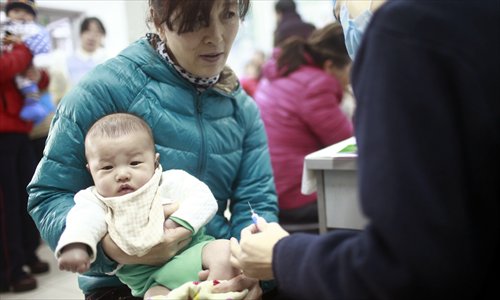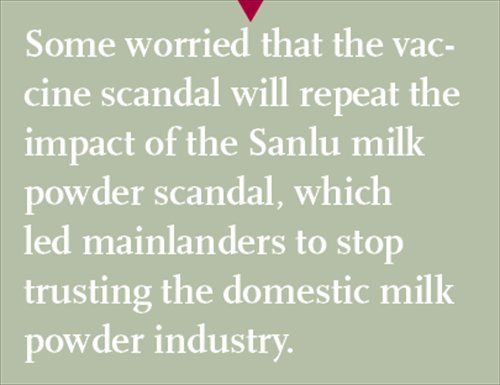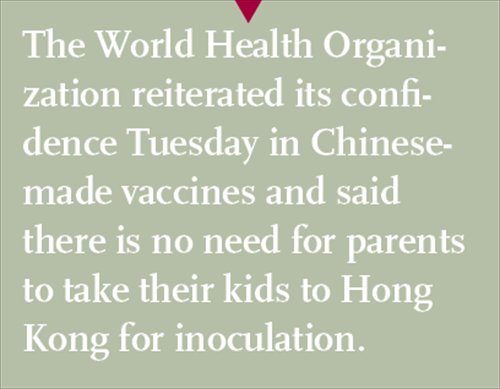Parents turn to Hong Kong clinics as vaccine scandal fuels fear
The recent vaccine scandal has led to another crisis of confidence for Chinese consumers. While mainland health experts and drug manufactures worry that it might lead to people avoiding domestically made vaccines, some Hongkongers have started to fret that an influx of mainlanders might cause a scarcity of the vital injections on the tiny region.

A baby receives a vaccination in Beijing. Photo: Li Hao/GT
The past two weeks have been a roller coaster for Ran Jinfa, father of 2-year-old son from Southwest China's Chongqing Municipality. He has been trying to trace the source of a dozen vaccine shots given to his son, as well as their delivery and storage information.
But it has proven difficult to find this information that he has a right to know. He was met with cold-shoulders, buck-passing and red tape at local health departments.
In mid-March, police in East China's Shandong Province revealed that they busted a mother and daughter gang that allegedly sold "problematic vaccines" worth more than 570 million yuan ($88 million) nationwide since 2011. The investigation shows that the vaccines were improperly refrigerated and sold to health institutes through illicit means, meaning that many of them were ineffective and could have caused harm to patients, even death.
After hearing the news, Ran went to the Center for Disease Control (CDC) in Yongchuan district, Chongqing.
"The vaccine chief guaranteed to me that no problematic vaccines have been found in the city. But the next day I found Chongqing is on the list of places the problematic vaccines were sent," Ran recalled to the Global Times.
On March 19, the Shandong drug authorities issued a circular, revealing the identities of about 300 suspects involved in the illegal trade of problematic vaccines, from 24 provincial-level regions, including Beijing, Hunan, Chongqing and Xinjiang.
On March 21, Ran went to the Yongchuan maternal and child-care service center where his son was vaccinated and the Yongchuan CDC, asking about where his son's vaccines came from.
The CDC insisted their vaccines were not problematic and told him not to disturb their work.
"It seemed that they were reluctant to disclose the information, which makes me more skeptical about the vaccines," Ran said. "It's rather disappointing that they boldly breach the Government Information Disclosure Regulation."
Ran is just one of millions of parents who have been worried about the vaccine scandal. While some parents are angry and have decided to stop their kids from receiving vaccines, others are heading to Hong Kong for the injections.

Go to Hong Kong?
Government assurances have not totally cleared away parents' doubts. Parents from Xi'an and Shangluo in Northwest China's Shaanxi Province were recently detained for spreading rumors about which clinics received problematic vaccines.
Some parents said that they would suspend vaccination for their kids before the authorities solve the case and announce the batches and final destinations of all the problematic vaccines, but some said they would just take their babies to Hong Kong for vaccinations.
Articles have been published explaining how to get vaccinated in Hong Kong, including the certificates people should take and suggested clinics.
A mother surnamed Yang shared her experience of taking her kid to Hong Kong for vaccination after the scandal was reported.
"There are many parents here like me. Even though some vaccines in Hong Kong are much more expensive than in the mainland," Yang, a mother of a 4-year-old son from Shenzhen, South China's Guangdong Province told the Global Times. "I feel the vaccines are safer."
However, getting vaccinations in Hong Kong can be costly. In addition to the expensive vaccines, travel and accommodation can cost thousands of yuan.
An agent which helps mainlanders get vaccinations in Hong Kong estimated that every day 5,600 mainlanders head to Hong Kong to get vaccinated, the Guangzhou-based Time Weekly reported.
Zhang Yu, the chief of the immunology department at the Peking University Health Science Center, told the Global Times that the central government has been conservative and cautious while introducing new vaccines, which means Hong Kong has a wider range of vaccines available. "Every new vaccine needs a large-scale human trial in China. Besides, protecting national industries is also a consideration," Zhang said, pointing out that domestically made HPV vaccines are currently undergoing clinic trials in China.
To grasp the opportunity the scandal offers, some agencies have started a promotion drive.
On March 23, Mega Healthcare, a healthcare management provider in Shanghai, promoted an article in the media, titled "No more fretting about vaccinations in the mainland. Go HK, safe and secure."
Some clinics in Hong Kong said the number of calls from the mainland inquiring about vaccination have increased. Cheng Chi Man, a family doctor in Hong Kong, told the Global Times that his clinic is receiving over a dozen such inquiries daily and he was planning to expand his vaccine inventory.
Some Hongkongers worry that the inflow of mainlanders seeking vaccines might cause the same kind of scarcity that was seen after the Sanlu milk powder scandal in 2008 led mainlanders to stop trusting the domestic milk powder industry.
Following the milk powder scandal, surging mainland demand for overseas baby formula emptied the shelves of many Hong Kong stores and supermarkets, prompting complaints and protests from local parents.
Mainland children coming to Hong Kong for vaccinations has caused shortages of certain types of vaccines in Hong Kong since mid-2015, financial news portal yicai.com reported. However, such shortages have only been seen in the private sector, and local Hong Kong children receive free vaccinations through the region's public immunity system.
In an interview with the Global Times on Friday, the Hong Kong health authorities said no shortage of vaccines has yet been discovered in the region and they will try to increase supplies if the demand is increasing.

Made-in-China vaccines crisis?
Zhang Yu denied the possibility that people will stop using domestic vaccines. "The major consequence of the problematic vaccines this time is the effectiveness loss, unlike the milk powder scandal," he told the Global Times.
The World Health Organization reiterated its confidence Tuesday in Chinese-made vaccines and said there is no need for parents to take their kids to Hong Kong for inoculation.
China's public vaccination system is fundamentally sound, although "the vaccines that are in the private sector need to be managed, stored, handled, distributed and used in accordance with recognized standards," Lance Rodewald, a WHO expert on immunization, told a press briefing, according to AFP.
In late 2013, reports that 17 babies died after receiving Hepatitis B (HBV) vaccine circulated online. Although the authorities denied links between the two after an investigation, the HBV vaccination rate dropped by 30 percent in 10 provincial-level regions in the following months. Several medical experts agreed that media's reports that used phrases like "deadly vaccines" were to blame.
It's essential to spread awareness of vaccines and revive public confidence in vaccines, Zhang noted. "The country's immunity program is a major contributor to the growth of life expectancy," he said.
Before the public vaccination program came into effect, the HBV infection rate was around 12 percent. Afterwards the infection rate of children under 15 was no more than 1 percent, Zhang said.
It seems that many people are still confident in domestic vaccines. On an app called Qinbaobao, one of the leading parenting apps in China with more than 15 million users, at least 11 parents raised concerns over the vaccines on the forum in past week, drawing more than 200 comments. Most of them said they would continue to use the national planed immunity program.
"Some of my friends are inviting each other to take kids to Hong Kong to get vaccination, and some parents responded. But I didn't," Liu Ziran, a mother of 4-month-old baby, told the Global Times.
"It's unrealistic to take babies to Hong Kong back and forth just for vaccination. Besides, I still believe most vaccines in the mainland are qualified, and domestically made vaccines will better fit Chinese nationals," she said.
There is still an absence of a trustworthy vaccine management system, Zhang added.
"Government supervision couldn't solve all the problems unless basic moral values were established," he said, citing that he heard that many drivers in cold-chain logistics turn off their refrigerators to cut fuel costs.
"To avoid that, the supervisors have to install Global Positioning System in the vehicles and transmit real time pictures of the cargo. This method works but how much will it cost?" Zhang asked.
Governmental response
Many have slammed the government's inadequate supervision of the vaccine trade. According to Shandong police, the mother in the gang, surnamed Pang was given a three-year suspended prison sentence with five years of probation for illegally trading vaccines in 2009. But in 2011, she resumed the business.
To quench the widespread anger and ease public panic, on March 21, the Shandong food and drug administration issued the names of all the vaccines Pang and her daughter sold, including 12 vaccines for diseases like meningitis, poliomyelitis and rabies, which are all classified in China as "type B" vaccines that are voluntary and paid for by the recipients.
China started its public immunity program in 1978, which provides free "type A" vaccines for children against a total of 15 diseases, including HBV, measles and Hepatitis A.
None of these vaccinations are technically mandatory, but children that have not received type A vaccines are not allowed to go to kindergartens or primary schools.
On March 22, Chinese Premier Li Keqiang vowed no leniency for anyone involved in the sales of problematic vaccines and pledged to punish officials who failed to do their duty to stop the spread of low-quality vaccines.
On March 24, Ran finally received a stamped document from the child-care center which contained the batch numbers and manufacturers of all the vaccines his son received.
Luckily, none of the manufacturers listed were those linked to the scandal.
But Ran didn't stop. He took the document to the Yongchuan CDC, demanding more information about the storage and delivery of the vaccines.
Although he was treated rudely, the center finally agreed to provide the information.
"They complained that if everyone asked for information like me, they would be so busy they would die," Ran said. "I responded I wouldn't need to ask if you actively released the information."
Newspaper headline: Immune to trust